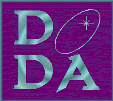You are here
News
DDA Endorses Astro 2020's State of the Profession Report
The Division on Dynamical Astronomy recognizes the significant barriers faced by underrepresented groups in the astronomical profession. We endorse the Astro 2020 decadal survey’s report of the panel on the ‘state of the profession and societal impacts’ and are committed to its set of equity-advancing values.
2022 Annual Prizes Announced
Vera Rubin Early Career Prize to Dr. Kathryn Volk 
DDA’s annual Vera Rubin Early Career Prize (https://dda.aas.org/awards/rubin) recognizes an early career dynamicist who demonstrates excellence in scientific research in dynamical astronomy or a closely related field, has had impact and influence on these fields, and shows a promise of continued excellence as demonstrated by past practice in research, teaching, and the advancement and support of the field of dynamical astronomy.
The American Astronomical Society’s Division on Dynamical Astronomy (DDA) is pleased to announce that the 2022 recipient of the Vera Rubin Early Career Award is Dr. Kathryn Volk of the University of Arizona, for her work on both the dynamics of small bodies beyond Neptune, and the long-term dynamics and stability of tightly packed exoplanetary systems.
Dr. Volk earned her Ph.D. from the University of Arizona in 2013 under the direction of Prof. Renu Malhotra, then held a postdoctoral fellowship at the University of British Columbia before returning to the University of Arizona, first as a postdoctoral associate and later as an Associate Staff Scientist. Her numerous contributions span both Solar System and exoplanetary science, powerfully bringing together theory, numerics and observation.
Orbital migration of the giant planets early in the Solar System’s history can explain various small-body populations in the outer Solar System. In particular, groups of trans-Neptunian objects (TNOs) captured into different mean motion resonances with Neptune are natural consequences of the latter migrating outward, and close encounters with Neptune are thought to be responsible for the dynamically excited scattered disk. Dr. Volk has made fundamental contributions both to the observational characterization of these small-body populations through her core role in the Outer Solar System Origins Survey, as well as to rigorously confronting this theoretical picture of the early Solar System against observations through her extensive numerical investigations. Her work has been influential in quantifying the rates at which Jupiter-family comets are generated from their hypothesized source in the scattered disk beyond Neptune, and in characterizing the underlying resonant TNO populations as observational anchors for theories of the early Solar System.
Dr. Volk has also significantly shaped the field of exoplanetary science. Her proposal that most planetary systems begin in compact configurations, which continually destabilize and rearrange throughout their lifetimes, has been highly influential, and she has made fundamental contributions to our understanding of the long-term dynamical stability of exoplanetary systems. In particular, her work demonstrates that the future lifetimes of mature exoplanet systems are set by slow chaotic diffusion induced by the overlap of secular (rather than mean-motion) resonances.
Finally, Dr. Volk has made central and persistent contributions to the division itself. Her leadership as Vice-Chair and then Chair of the DDA was instrumental through the COVID-19 pandemic. She was the principal force behind the restructuring and organization of the highly successful 2020 and 2021 meetings in a virtual format, not only maintaining the operations of the division, but also managing to grow and diversify the membership in the process.
Dr. Volk will be invited to give a lecture at the 54th annual DDA meeting in the spring of 2023.
Dirk Brouwer Career Award to Dr. Harold Levison 
DDA’s annual Dirk Brouwer Career Award (https://dda.aas.org/awards/brouwer) recognizes a major contributor to the field of dynamical astronomy who demonstrates excellence in scientific research, has had a proven impact and influence in the field, demonstrates excellence in the teaching and training of students, and provides outstanding advancement and other support of the field through administration, public service, or engineering achievement.
The American Astronomical Society's Division on Dynamical Astronomy (DDA) is pleased to announce that the 2022 Dirk Brouwer Career Award is given to Dr. Harold (Hal) F. Levison (Southwest Research Institute, Boulder, CO) to recognize and celebrate his outstanding contributions to the field of planetary dynamics.
Dr. Levison is well known for his longstanding, important work on the dynamical evolution of small bodies in the solar system. Early in his career, he developed the popular Swift planetary integrator. This numerical tool permits users to simulate accurately and efficiently the evolution of a planetary system. It is one of the pioneering works in the field, and the current ubiquity of such integrators illustrates his forward-thinking ability.
Dr. Levison is also well-known for being a key contributor of the “Nice model.” This model of early evolution of the Solar System established a leading paradigm for the early dynamical evolution of the outer solar system, with implications for populations of minor bodies throughout the solar system. In particular, the model predicts dynamical capture of small bodies into orbits near Jupiter’s L4 and L5 Lagrange points. In an unusual move for a theorist, Dr. Levison led the successful proposal of a spacecraft mission to test the model’s predictions. He is PI of the Lucy mission currently en route to the Trojan asteroids of Jupiter. Dr. Levison’s dedication to every aspect of this mission, including technical ones, permitted to launch it on schedule despite the Covid pandemic.
In addition to his own research, Dr. Levison has mentored many young scientists and helped rejuvenate the DDA, at which he is a long-term attendee.
Dr. Levison earned his PhD in Astronomy from the University of Michigan in 1986. After completing postdoctoral work at NASA Ames Research Center, he spent several years at the U.S. Naval Observatory. He moved to Southwest Research Institute in 1992, where he is now a Chief Scientist/Program Director in the Department of Space Studies.
Dr. Levison will be invited to give a lecture at the 54th annual DDA meeting in the spring of 2023.
